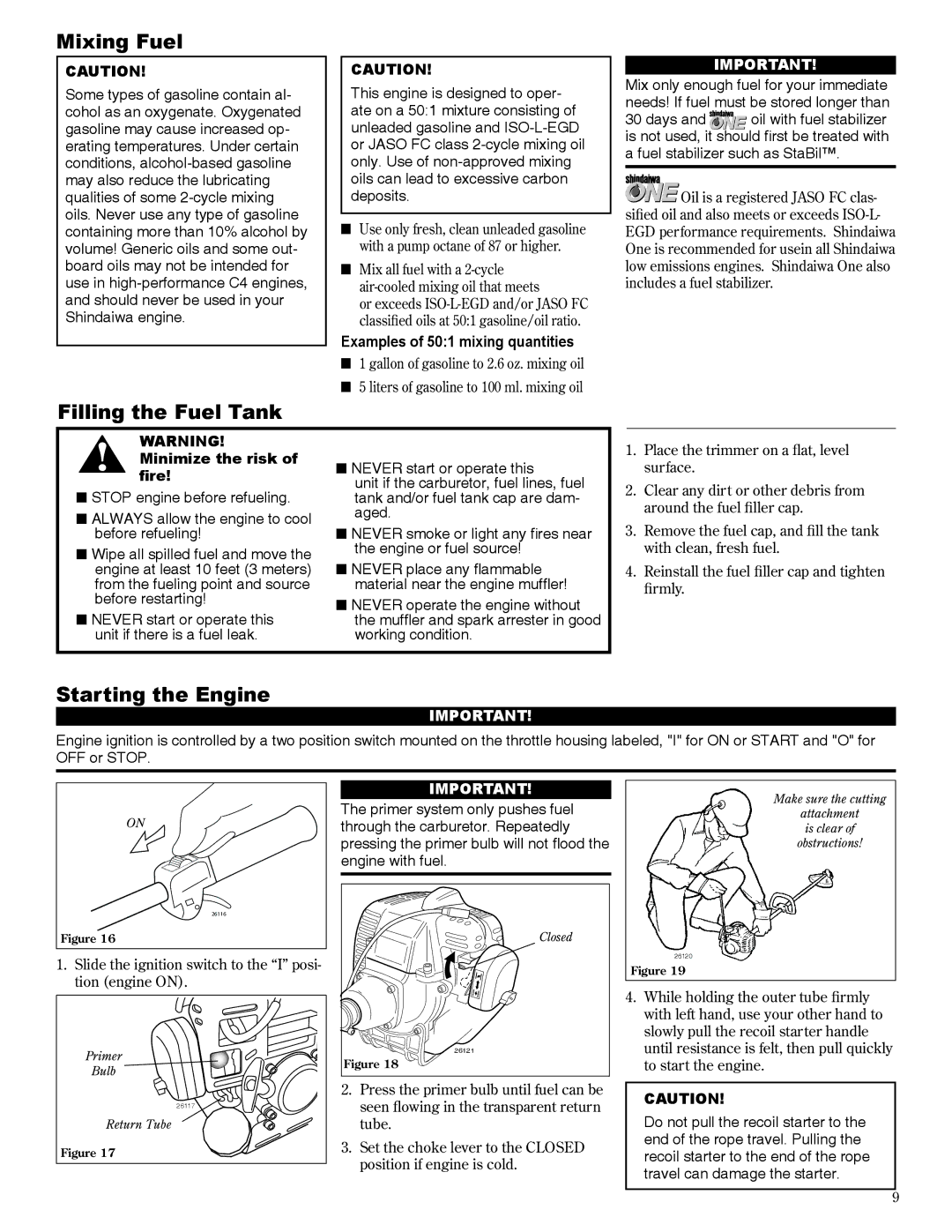
Mixing Fuel
CAUTION!
Some types of gasoline contain al- cohol as an oxygenate. Oxygenated gasoline may cause increased op- erating temperatures. Under certain conditions,
CAUTION!
This engine is designed to oper- ate on a 50:1 mixture consisting of unleaded gasoline and
nUse only fresh, clean unleaded gasoline with a pump octane of 87 or higher.
nMix all fuel with a
or exceeds
Examples of 50:1 mixing quantities
n1 gallon of gasoline to 2.6 oz. mixing oil
n5 liters of gasoline to 100 ml. mixing oil
IMPORTANT!
Mix only enough fuel for your immediate needs! If fuel must be stored longer than
30 days and oil with fuel stabilizer is not used, it should first be treated with a fuel stabilizer such as StaBil™.
![]() Oil is a registered JASO FC clas- sified oil and also meets or exceeds
Oil is a registered JASO FC clas- sified oil and also meets or exceeds
Filling the Fuel Tank
WARNING! Minimize the risk of fire!
nSTOP engine before refueling.
nALWAYS allow the engine to cool before refueling!
nWipe all spilled fuel and move the engine at least 10 feet (3 meters) from the fueling point and source before restarting!
nNEVER start or operate this
unit if there is a fuel leak.
nNEVER start or operate this
unit if the carburetor, fuel lines, fuel tank and/or fuel tank cap are dam- aged.
n NEVER smoke or light any fires near the engine or fuel source!
n NEVER place any flammable material near the engine muffler!
nNEVER operate the engine without the muffler and spark arrester in good working condition.
1.Place the trimmer on a flat, level surface.
2.Clear any dirt or other debris from around the fuel filler cap.
3.Remove the fuel cap, and fill the tank with clean, fresh fuel.
4.Reinstall the fuel filler cap and tighten firmly.
Starting the Engine
IMPORTANT!
Engine ignition is controlled by a two position switch mounted on the throttle housing labeled, "I" for ON or START and "O" for OFF or STOP.
| IMPORTANT! | Make sure the cutting | |
| The primer system only pushes fuel | ||
ON | attachment | ||
through the carburetor. Repeatedly | is clear of | ||
| pressing the primer bulb will not flood the | obstructions! | |
| engine with fuel. |
| |
26116 |
|
| |
Figure 16 | Closed |
| |
1. Slide the ignition switch to the “I” posi- |
| 26120 | |
| Figure 19 | ||
tion (engine ON). |
| ||
| 4. While holding the outer tube firmly | ||
|
| ||
|
| with left hand, use your other hand to | |
|
| slowly pull the recoil starter handle | |
Primer | 26121 | until resistance is felt, then pull quickly | |
Figure 18 | to start the engine. | ||
Bulb | |||
|
| ||
| 2. Press the primer bulb until fuel can be | CAUTION! | |
26117 | seen flowing in the transparent return | ||
| Do not pull the recoil starter to the | ||
Return Tube | tube. | ||
Figure 17 | 3. Set the choke lever to the CLOSED | end of the rope travel. Pulling the | |
recoil starter to the end of the rope | |||
position if engine is cold. | |||
| travel can damage the starter. | ||
|
|
